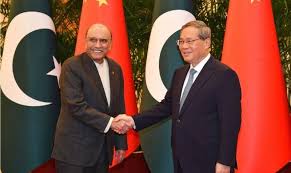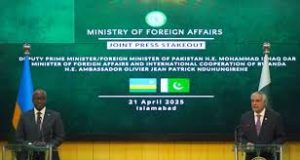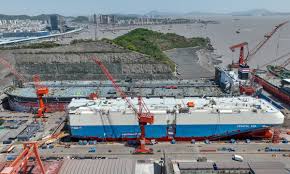Islamabad needs more US military equipment to fight TTP, Pakistan’s ambassador says

Pakistani Taliban have been emboldened since US departure from Afghanistan in 2021
The US should urgently provide Pakistan with additional military equipment as it counters a surge in attacks by the Pakistani Taliban, Islamabad’s envoy to Washington has said.
Ambassador Masood Khan also told The National that his country requires some $100 billion to adapt to the effects of climate change, which is wreaking havoc on the South Asian nation through deadly floods and heatwaves, and he called for the implementation of a “time-bound” two-state solution to end the Israeli-Palestinian conflict.
Pakistan has seen a sharp rise in attacks from the Pakistani Taliban, formally called the Tehreek-e-Taliban Pakistan (TTP), since the US left Afghanistan in 2021.
Islamabad says many of the assaults are launched from Afghan territory, something Kabul and the TTP deny.
“Our immediate need is equipment that would be helpful in fighting terrorism, the asymmetric threat from the Tehreek-e-Taliban Pakistan or other terrorists,” Mr Khan said in an interview at the Pakistan embassy in Washington.
“The TTP are using Afghan soil to mount attacks against Pakistan. In order to stop that, we need sniper rifles, night vision goggles, communication equipment. This has been part of our conversations with the United States, that in this area we should be helped.”
Tensions on the Afghanistan-Pakistan border have further increased since a ceasefire between the TTP and Islamabad unravelled in 2022, and Mr Khan considers the TTP the primary threat to Pakistan’s security.
According to the country’s Institute for Conflict and Security Studies, Pakistan suffered 409 militant attacks in the first five months of 2024, an 83 per cent increase compared to the same period a year before.
Most of the attacks are happening in Khyber Pakhtunkhwa in the north-west and Balochistan in the south-west. While the TTP and the Afghan Taliban are ideologically similar, the TTP are seeking to purge Pakistan government control from Pashtun tribal lands and push an ultraconservative interpretation of Islam across Pakistan.
“The Afghan leadership has assured us that they would deter TTP from mounting these attacks against Pakistan,” Mr Khan said.
“They haven’t succeeded yet, and we’ve had several rounds of conversations with them. And hopefully they would put the political will and operational arm behind their promises.”
Despite decades of security co-operation, the US-Pakistan relationship has seldom been straightforward, especially during the 20-year war in Afghanistan, when Washington accused Islamabad of playing a double game by supporting the Afghan Taliban while also benefiting from billions of dollars in US security assistance.
Relations hit a low point when, in 2017, then-president Donald Trump in 2017 cut $1.3 billion in security assistance to Pakistan. Under the Biden administration, ties have improved slightly and in 2022 Congress authorised a $450 million sales package to sustain Pakistan’s fleet of F-16s.
“We welcomed that, and that was a very big signal. And we were hoping that there would be another sustainment package too. But that hasn’t materialised yet,” Mr Khan said.
“Over the decades we bought many US defence platforms. For the army, for navy for air force, they need to be sustained therefore, we need spares. But we also need new equipment and new platforms, we need aircraft, we need helicopters, we need C-130s”.
Since the Taliban took power in 2021, Pakistan has argued that the security situation in Afghanistan has improved to the point that it is safe for Afghan refugees living along the Pakistan border region should return.
Last October, Pakistan announced the Illegal Foreigners’ Repatriation Plan that aims to expel 1.7 million refugees. Rights groups have said many of those being deported could face persecution in Afghanistan.
Mr Khan said members of the US Congress ask him about the plan. He said of the 4 million undocumented people living in Pakistan, 1.7 million “had to be sent back to Afghanistan”.
“The bulk of the Afghans who were in Pakistan, they went back to their homeland voluntarily, some 98 per cent. We didn’t have to force them,” said Mr Khan, a Pakistani diplomat who previously served as ambassador to the UN.
“These are undocumented refugees who just would walk into Pakistan without any papers, without any registration in Pakistan. … We’ve been talking about this and explaining to the people here [in the US]“.
Climate change abatement and Pakistan’s views on the Israel-Gaza war
Pakistan has been very vocal on Gaza, saying Israel should be held to account for any war crimes that it may have committed.
Mr Khan reiterated his country’s calls for a permanent ceasefire and for the establishment of multiple aid corridors to help Gazans.
He also called for a “time-bound formula” to guarantee progress towards a two-state solution.
“The United States can lead that effort to ensure the establishment of a Palestinian state and to make a two-state solution a reality,” he said.
Mr Khan said recent weather events in Pakistan illustrate the urgent need for nations to contribute to the Loss and Damage Fund that went into operation in 2022. The fund was established to help people in vulnerable communities recover from the effects of climate change.
Jacobabad, in Sindh province, is one of the hottest cities on Earth, with temperatures last year touching 51°C. A deadly heatwave across South-east Asia has hit Pakistan hard, just two years after floods across the country caused more than $30 billion of damage.
“There are many ways in which we can mitigate these devastations over time. We need money,” he said.
“We need for this kind of transformation to a climate-resilient economy. We need at least $100 billion for renewables, for afforestation and so on.”
On the broader Pakistani economy, Mr Khan pointed to several sectors Islamabad is focusing on in terms of drawing greater foreign investment, including IT, mining, agriculture and energy.
Pakistan is on track to secure a new loan from the International Monetary Fund and macroeconomic factors are shifting in its favour as it works to boost its economy, the country’s finance minister told The National in April.
Pakistan’s stock market has been on a tear after reforms agreed to with the IMF, almost doubling in the past year to become the world’s top performer in dollar terms.
Islamabad is still finalising terms of a new loan from the IMF that reportedly could be as much $8 billion.





